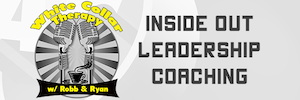PODCAST
Choose a job you love, and you will never have to work a day in your life.
It’s a famous quote attributed to Confucius, Mark Antony and simply ‘an old professor’.
While the origins of the phrase may be murky, one thing that’s for sure is that it’s both true and untrue.
Confused yet?
That’s basically the crux of our conversation today.
Full Video Replay
VIDEO
Ryan recently spoke with a colleague who had become a bit disenchanted with his present career in the auto industry. The culture of that focuses on leadership mentality and is driven by performance can be a pressure cooker for greatness, but it can become toxic in some settings.
After researching different options and weighing the pros and cons, inspiration and passion won out. In the end, he chose financial planning. Financial planning may sound like a quick route to a lucrative career, but that’s not actually the case. It can years to begin to see what people would call ‘real money’ – if you end up seeing that at all. In most cases, it’s about helping people plan for their own modest retirement, college educations to help their children or even establishing the means to care for for adult children who will require care long after their parents are gone. It’s about helping people, getting involved in the ins and outs of their lives well enough to help them not only navigate today, but get ready for tomorrow.
It was a decision that struck a chord with Ryan. “I told him, so many people so many people don’t go this path. So many people go where it’s either easiest or the most lucrative and don’t take the hard road.”
It’s a concept at the core of Robb and Ryan’s relationship as well. Robb was advocating to question your career choice and look to your personal passions over a decade ago when the two first met. Robb was conducting a workshop about questioning Why Do You Do What You Do? For Ryan, it was a game changer. The idea of using your passion and talent to dictate not just your side interests or hobbies … but to use them to establish and build a successful career?
How do I get started?
Talking about following your passion is one thing, finding realistic ways to incorporate and actually DO it, is quite another.
“If you truly want to get a little bit more on point today than you were yesterday with your life purpose,” Robb suggests, “Start thinking through a problem that drives you up the wall in this world. It could be a business problem, it could be a family problem, it could be a humanitarian and philanthropy problem or an injustice in this world. Whatever it is, think of what small step can you take towards being a solution for that problem.”
It comes down to setting out what you have to work with, and where you wanna be. It means understanding exactly who you are to see how you fit into the world and how you can position yourself to make the contribution you were meant to.
Or, to put it more succinctly, “Who you are has everything to do with why you’re here.”
Robb breaks it down into building a foundation from five specific areas:
- Personal Core Values – What personal beliefs or convictions drive and guide you?
- Top Strengths & Natural Talents – What skills, talents and interests have been a part of your life from childhood?
- Passion – What ignites and inspires you, even if only in your free time?
- Life Milestones – Which major events (good and bad) have formed or changed the person you are today?
- Primary Gift in Life – What legacy do you want to leave behind to friends, family or the world?
This road map to discovering your life’s purpose leads to more than tangible rewards – although many people find that it does.
Looking inward in order to find out what you need to do to fulfill your life’s purpose is, in itself, no easy task. But having that passion to want to leave something behind, to make your mark, fuels the work you need to do to simply get started.
From there, passion for what you ultimately decide to do continues to fuel that work.
And you WILL work.
The old truism of never working a day in your life when you do something you love is only true because love makes you a little crazy. When you’re following your passion and doing something you love, you’ll work harder than you ever have before. You’ll put in more hours, more energy, more effort, more of yourself.
That passion and dedication translates into plenty of pay-offs. The enthusiasm you bring to your own work makes you more attractive to colleagues, clients or customers. That enthusiasm also inspires employees (MIT study about motivation?) to double down and follow the leadership you’re displaying not because of a training or performance initiative, but because you’re doing what you were meant to do. It becomes a way of mentoring and encouraging every person you meet to do the same. It helps to create a domino effect of people following their dreams.
With that in mind, we’re checking out the “21-Day Reprogram Your Brain” Challenge to have a happier work life. Ryan picked up the idea through a TED Talk (link?) and has been working to implement the steps it outlines in his daily routine. SImple, mindful tasks such as meditation, journaling and prioritizing – a foundation of good, healthy and effective habits meant to focus your attention and intention.
Stay Tuned.
Having passion for what you do – fuels you / makes you work harder / makes that hard work easier to do / makes it easier to encourage others to follow their own passion / domino effect
Incl MIT Study?
http://www.novarete.com/blog/motivate-employees-monetary-incentives-produce-poor-performance
https://sloanreview.mit.edu/tag/employee-motivation/
TED Talk
